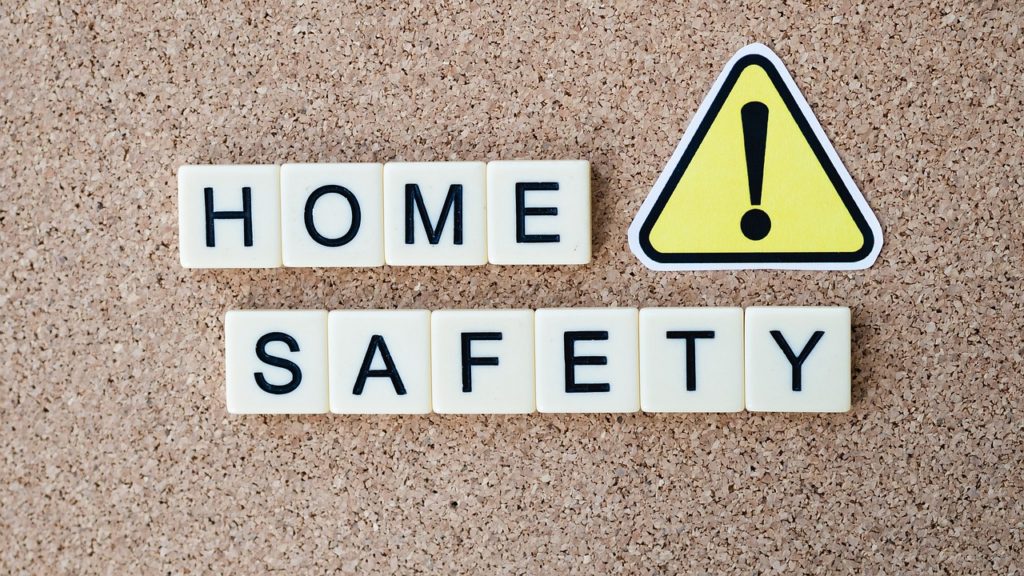Home safety tips for seniors are needed to help them feel independent and happy for as long as possible.
Keeping independence is a top priority for the elderly and it’s no surprise 90% want to stay in their own homes.

Even when requiring daily assistance 82% of seniors would still rather stay in their own home.
Falling and fracturing a hip is the leading cause of injuries in seniors resulting in hospitalization and decreased mobility.
There are many safe and effective ways to secure a home to protect against common injuries.
Here are 50 Home Safety Tips for Seniors
Kitchen
- Clean up spills as soon as possible.
- Avoid using a stool to reach pots and pans off high shelves. Keep items at arms reach.
- Use unbreakable dinnerware to avoid injuries from broken glass.
- Never leave food unattended while cooking.
- Place an anti-skid mat in front of the sink to gather up water to avoid a fall hazard.
Bathroom
- Install a sturdy shower bench to rest if needed or to stay seated while cleansing.
- Opt-in for a handheld showerhead so it’s easy to bathe sitting or standing without excessive bending.
- Install additional grab bars by the toilet and in the shower.
- Make sure toilet seat is at proper height as squatting down can result in a fall.
- Add automatic nightlights or stick on lights for nighttime bathroom visits.
Bedroom
- If their bed is too high, consider an adjustable steep stool with a handle.
- A messy room is a recipe for disaster. Clear the floors, keep clothes in drawers and clutter tucked away to avoid tripping in the middle of the night to use the bathroom.
- Keep a cordless phone next to the bed to have in case of an emergency.
- Avoid rugs. Sliding rugs next to the bed can be a sliding hazard unless they are properly secured. Consider a low-profile anti-slip mat if one is needed.
- Consider installing bed rails if falling out of bed is a possibility.
Living Room
- Furniture should be arranged with adequate space in-between each piece.
- Make sure furniture is the appropriate size and height.
- Replace any chairs with wheels.
- Remove unnecessary hard to see floor decorations such as magazine racks or baskets. Also, remove power cords and wires or secure them down with tape or floor cord covers.
- Every chair needs armrests as ones without present a serious risk of falling.
Laundry Room
- Keep laundry supplies only in the laundry room to avoid lugging heavy detergent bottles around.
- Avoid lifting laundry baskets. Use a rolling hamper to transport clothes in and out of the laundry room.
- If your home is a two-story, consider installing a laundry shoot or keeping a dresser downstairs and changing there.
- Front loading washer and dryers are the best options as they prevent bending over hazards such as back strain and being thrown off balance. Get a pair with pedestals to get it to the perfect height.
- Avoid leaving clothes on the floor which can turn into tripping hazards. Always keep them in laundry baskets.
Stairs
- Never leave items on the stairs which can lead to falling hazards.
- Avoid dark carpets or disorienting patterns on stairs.
- Hang on to the railing tight all the way up and take your time.
- Always turn on the light before heading upstairs to ensure a completely illuminated path.
- Never wear high heels on stairs, opt for low-heel, anti-slip shoes for added support and safety.
Lawn
- Inspect yard for loose rocks, holes, roots and other potential hazards for repair or removal.
- Carry a cane or walking stick to use for assistance on any uneven ground.
- Have a cell phone with you at all times.
- Have a clear pathway to and from the door and consider installing motion center lights alongside it.
- Avoid ladders at all costs. A quick misstep can cost complete independence or worse.
Additional Safety tips from Our Senior Safety:
- Make sure a smoke detector is installed in every room.
- Get just as many carbon monoxide detectors.
- Have a cell phone on you at all times or make sure a phone is in every room in case of emergencies.
- Get a wearable medical alert which can send a signal to send out medical personnel for immediate assistance.
- Keep walking aids within reach.
- Keep hands free whenever possible.
- Keep things secure. Install tip-resistant hardware to things like dressers, heavy bookshelves, and entertainment stands.
- Avoid freshly mopped floors.
- Make sure all areas of the home can be illuminated.
- Avoid wearing long and loose clothing.
- Exercise to strengthen bones for increased mobility.
- Chew slowly and cut small pieces.
- Never smoke but definitely never when alone or in bed.
- Have at least one fire extinguisher in an easily accessible location.
- Have easy access to emergency numbers including poison control and the local police.